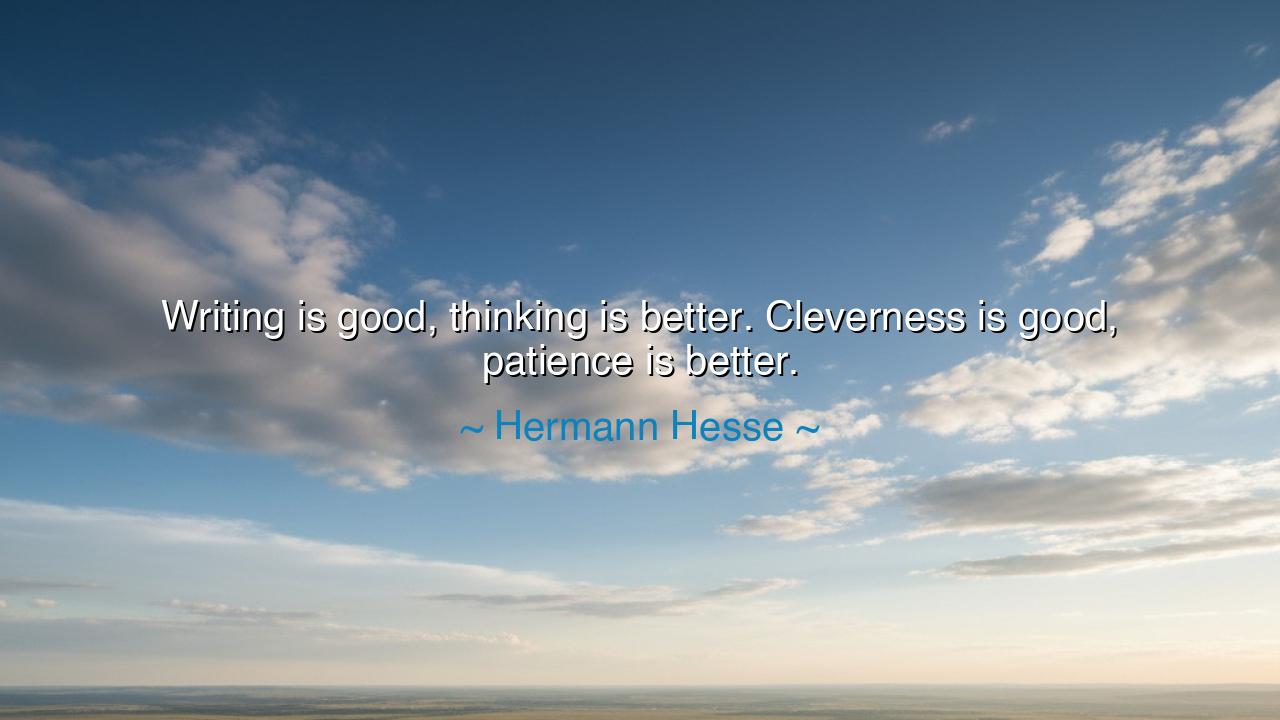
Writing is good, thinking is better. Cleverness is good






The Nobel Prize–winning writer Hermann Hesse, whose works such as Siddhartha and Steppenwolf explore the depths of the human spirit, once declared: “Writing is good, thinking is better. Cleverness is good, patience is better.” In this profound utterance, he places before us a hierarchy of virtues, urging us to look beyond the surface of talent and skill toward the deeper treasures of wisdom. For while writing and cleverness are admirable, they shine only for a moment; but thinking and patience endure like ancient pillars that hold up the temple of truth.
To say that writing is good, but thinking is better is to remind us that the word is but a vessel, while the thought is the water it carries. A page may be filled with sentences, yet without true thought, they are empty shells. But one deep idea, even if never written, has the power to shape a lifetime. Hesse himself knew this through his journey of inner seeking. His writings were not mere exercises in style, but reflections born from long contemplation, meditation, and dialogue with the mysteries of existence. Thus he teaches us that the root is always more powerful than the branch.
In the second half of his teaching, Hesse declares: cleverness is good, but patience is better. Cleverness dazzles with quick solutions, witty responses, and immediate results. Yet cleverness is like a flash of lightning — brilliant, but brief. Patience, on the other hand, is like the steady sun that ripens the harvest. It allows understanding to deepen, relationships to heal, and great works to come to completion. Without patience, cleverness can become arrogance; with patience, cleverness matures into wisdom.
History offers us a shining example in the life of Isaac Newton. His brilliance was unmatched, but it was not cleverness alone that gave the world the laws of motion and the theory of gravity. It was his patience in observation, his willingness to watch the apple fall, to calculate endlessly, and to wait upon truth until it revealed itself. His genius would have been nothing without the patience to nurture it. In Newton’s story, we see Hesse’s words brought to life: cleverness shines, but patience conquers.
The teaching also finds echo in the spiritual traditions. The Buddha himself spent long years in contemplation beneath the Bodhi tree, embodying both thinking and patience. He did not rely on clever arguments or hasty conclusions; he endured trial and temptation, waiting upon enlightenment. His wisdom spread not because of quickness, but because of depth. Hesse, deeply influenced by Eastern philosophy, wove this truth into his words: that the greatest treasures are uncovered not in haste, but in quiet endurance.
The lesson for us today is both clear and urgent. In a world that prizes quick answers, fast words, and instant cleverness, we are tempted to mistake noise for wisdom. Yet Hesse reminds us to return to the still disciplines of thinking and patience. Before speaking, think. Before acting, wait. Before judging, endure. In doing so, our words will carry weight, our actions will bear fruit, and our lives will move not with frenzy, but with purpose.
Therefore, O seekers of truth, take Hermann Hesse’s words as a compass. Strive not only to write, but to think. Strive not only to be clever, but to be patient. For in thinking, you discover depth, and in patience, you acquire strength. These two together form the bedrock of wisdom, stronger than brilliance, more enduring than fame. And if you walk with them as companions, your journey will not be fleeting like lightning, but lasting like the eternal sun.






AAdministratorAdministrator
Welcome, honored guests. Please leave a comment, we will respond soon